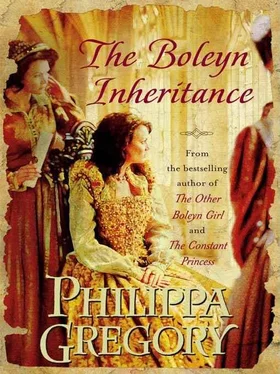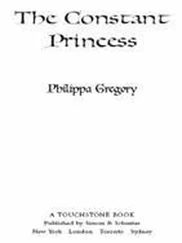She looks at me with her straight gaze, and for the very first time I think that perhaps I have underestimated this girl. Perhaps she is not a fool. Perhaps behind that honest face there is quick intelligence. Because she cannot speak my language I have talked to her as if she is a child and I have thought of her with the wit of a child. But she is not frightened by these ghosts – she is not even haunted by them, as I am.
She shrugs. “Queens before,” she says. “Now: Anne of Cleves.”
Either this is a high courage, or it is the stoicism of the very stupid.
“Are you not afraid?” I ask very quietly.
She understands the words, I know she does. I can see it in her stillness and the sudden attentive tilt of her head. She looks at me directly. “Afraid of nothing,” she says firmly. “Never afraid.”
For a moment I want to warn her. She is not the only brave girl to sit in this box to be honored as queen and then end her life stripped of her title, facing death alone. Katherine of Aragon had the courage of a crusader, Anne the nerves of a whore. The king brought them both down to nothing. “You must take care,” I say.
“I afraid of nothing, am,” she says again. “Never afraid.”
Anne, Whitehall Palace,
January 1540
I was dazzled by the beauty of the palace of Greenwich, but I am shaken to my shoes by Whitehall. More like a town than a palace, it is a thousand halls and houses, gardens and courts, in which only the nobly born and bred seem to find their way around. It has been the home of the Kings of England forever, and every great lord and his family have their own houses built inside the half a dozen acres of the sprawling palace. Everyone knows a secret passage, everyone knows a quick route, everyone knows a door that is conveniently left open to the streets, and a quick way down to a pier on the river where you can get a boat. Everyone but me and my Cleves ambassadors, who are lost inside this warren a dozen times a day and who feel more stupid and more like peasants abroad each time.
Beyond the gates of the palace is the city of London, one of the most crowded, noisy, populous cities in the world. From dawn I can hear the street sellers calling, even from my set of rooms hidden deep inside the palace. As the day goes on the noise and business increases until it seems that there is nowhere in the world that can be at peace. There is a constant stream of people through the palace gates with things to sell and bargains to make and, from what Lady Jane tells me, a continual stream of petitions for the king. This is the true home of his Privy Council; his parliament sits just down the road at the Palace of Westminster. The Tower of London, the great fortified lodestone of every king’s power, is just down the river. If I am to make this great kingdom my home, I shall have to learn my way around this palace, and then find my way around London. There is no point in hiding in my closet, overwhelmed by the noise and the bustle; I have to get out into the palace and let the people – who crowd in their thousands from dawn till nightfall – look at me.
My stepson, Prince Edward, is on a visit to court; he can watch the jousting tomorrow. He is allowed to court only seldom for fear of taking an infection, and never in the summertime for fear of the plague. His father worships the boy, for his own little fair head, I am sure; but also because he is the only boy, the only Tudor heir. A single boy is such a precious thing. All the hopes of this new line rest on little Edward.
Lucky that he is such a strong, healthy child. He has hair of the fairest gold, and a smile that makes you want to catch him up and hug him. But he is strongly independent and would be most offended if I were to press my kisses on him. So when we go to his nursery, I take care only to sit near him and let him bring his toys to me, one by one, and each one he puts into my hand, with great pleasure and interest. “Glish,” he says. “Maow.” And I never catch his little fat hand and plant a kiss in the warm palm, though he looks up at me with eyes as dark and as round as toffee and with a smile as sweet.
I wish I could stay in his nursery all day. It does not matter to him that I cannot speak English or French or Latin. He hands a carved wooden top to me and says solemnly, “moppet,” and I reply, “moppet,” and then he fetches something else. We neither of us need a great deal of language nor a great deal of cleverness to pass an hour together.
When it is time for him to eat, he allows me to lift him up into his little seat, and sit beside him as he is served with all the honor and respect that his own father commands. They serve this little boy on bended knee, and he sits up and takes his share from any one of a dozen rich dishes as if he were king already.
I say nothing as yet, because it is early days for me as his stepmother; but after I have been here awhile longer, perhaps after my coronation next month, I shall ask my lord the king if the boy cannot have a little more freedom to run about and play, and a plainer diet. Perhaps we can visit him more often in his own household, even if he cannot come to court. Perhaps I might be allowed to see him often. I think of him, poor little boy, without a mother to care for him, and I think that I might have the raising of him, and see him grow into a young man, a good young man to be King Edward for England. And then I could laugh at myself for the selfishness of duty. Of course I want to be a good stepmother and queen to him, but more than anything else I long to mother him. I want to see his little face light up when I come into the room, not just for these few days, but every day. I want to hear him say “Kwan,” which is all he can manage of “Queen Anne.” I want to teach him his prayers and his letters and his manners. I want him for my own. Not just because he is motherless, but because I am childless and I want someone to love.
This is not my only stepchild, of course. But the Lady Elizabeth is not allowed to come to court at all. She is to stay at Hatfield Palace, some distance from London, and the king does not recognize her except as his bastard, got on Lady Anne Boleyn; there are those who say she is not even that, but another man’s child. Lady Jane Rochford – who knows everything – showed me a portrait of Elizabeth and pointed to her hair, which is red as coals in a brazier, and smiled as if to say there could be little doubt that this is the king’s child. But King Henry has made it his right to decide which children he shall acknowledge, and Lady Elizabeth will be brought up away from court as a royal bastard and married to a minor nobleman when she is of age. Unless I can speak to him first. Perhaps, when we have been married awhile, perhaps if I can give him a second son, perhaps then he will be kinder to the little girl who needs kindness.
In contrast, the Princess Mary is now allowed to court, though Lady Rochford tells me that she has been out of favor for years, ever since the defiance of her mother. The refusal of Queen Katherine to let Henry go meant that he denied the marriage and denied their child. I have to try not to think the worse of him for this. It was too long ago, and I am not fit to judge. But to visit on a child the coldness earned by the mother seems to me to be cruel. Just so did my brother blame me for the love that my father felt for me. Of course the Princess Mary is a child no longer. She is a young woman and ready for marriage. I think she is in poor health; she has not been well enough to come to court and meet me, though Lady Rochford says that she is well enough but that she is trying to avoid the court because the king has a new betrothal in mind for her.
I cannot blame her for that; she was to be betrothed to my brother William at one time, and then to a Prince of France, and then to a Hapsburg prince. It is natural that her marriage should be a matter of continual debate until she is settled. What is more odd is the fact that no one can ever know what they are getting when they buy her. There is no telling her pedigree, since her father has disowned her once and now recognizes her again, but could disown her again at any time, since nothing has any weight with him but his own opinion, which he says is the will of God.
Читать дальше
Конец ознакомительного отрывка
Купить книгу












